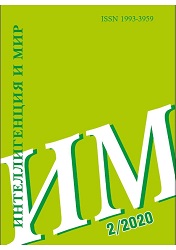Сила и бессилие «транснациональных интеллектуалов»: случай Ральфа Дарендорфа
The strength and powerlessness of “transnational intellectual”: the case of Ralph Dahrendorf
Author(s): Vasily Lvovich Chernoperov, Sergey Mihailovich UsmanovSubject(s): Social Philosophy, Contemporary Philosophy, Culture and social structure
Published by: Ивановский государственный университет
Keywords: Ralph Dahrendorf; intellectuals; Western elite; “powerless people”;
Summary/Abstract: The name of German-British intellectual Ralph Dahrendorf is well known to philosophers, political scientists, historians and especially sociologists in all parts of the world. However, after his death he was no longer mentioned as often as before in scientific and public publications. And only in recent years there has been a sort of return of R. Dahrendorf. This publication is also in line with this process. In addition, the authors of this article have tried to respond to criticisms of R. Dahrendorf's earlier evaluations, as well as to engage in correspondence discussions with foreign specialists and, above all, with Franzisca Meifort, who wrote a substantial and original study about this intellectual. The theoretical and methodological tools of the publication were primarily composed of Quentin Skinner’s prosopographical method, Quentin Skinner’s contextualism and Edmund Husserl’s phenomenological description. In this article, the authors seek to deepen and further test the concept of dividing Western intellectuals into three groups — “powerless people”, “independent experts” and “outsiders nonconformists”. As a result, the authors come to the conclusions, which, in general, coincided with the conclusions they had already made public earlier: R. Dahrendorf, despite all his activity, boldness of statements and fame, found himself in a cohort of “powerless people”. This statement is most relevant to his participation in political and public life. He was unable, and probably unwilling, to break out of the political strategy of the Western elite. According to the authors of this article, Dahrendorf’s “powerlessnessˮ is a sober awareness of the impossibility of crossing quite real borders, outlined by the interests of the Western political elite and the structures of the existing power. By accepting these rules of the game and making the utmost intellectual effort to defend or justify the political course of the collective West, Dahrendorf gradually became less and less productive as a thinker, especially in comparison with the works of the 1950s and 1960s.
Journal: Интеллигенция и мир
- Issue Year: 2020
- Issue No: 2
- Page Range: 69-83
- Page Count: 15
- Language: Russian

